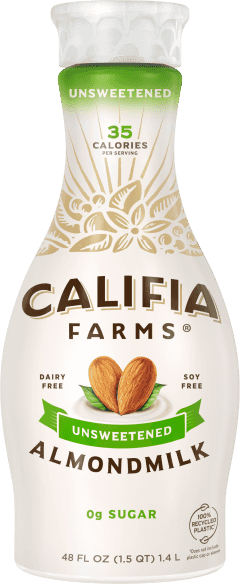Our Business
At Califia Farms, we are on a mission to create a future where plants replace dairy, without compromise.
We produce innovative, healthy, and great-tasting plant-based alternatives to dairy, including a wide range of plant milks, creamers, barista products, and brewed-to-blend coffees. We pride ourselves in selecting only the highest-quality ingredients from whole food plant sources.
Califia was an early mover in the plant-based space and today is one of the leading plant-based beverage brands in the U.S. In 2017, to help meet rising international demand, we established on-the-ground operations in the U.K., Australia, and Canada. Through a network of smaller distributorships, we also have a presence in several other countries.
Califia is headquartered in Los Angeles, with main operations located in Bakersfield, California.
Assessing Supply Chain Risk
At Califia Farms, we focus on creating long-term, collaborative relationships with our supplier base, which provide stability and certainty for our operations. Our procurement team works directly with suppliers to ensure reliable supply of goods and services and is responsible for managing supplier relationships end-to-end. Califia Farms currently sources ingredients, goods and services from over a hundred suppliers globally.
Our supply chain is complex and effectively assessing and addressing supply chain issues such as slavery, human trafficking, and other human rights concerns is often challenging. Since 2021, we’ve began using an independent third-party tool to conduct a risk analysis of our ingredient and manufacturing supply base with the goal of identifying any suppliers that pose an increased risk. This process is ongoing.
Respecting Human Rights
Califia Farms has a Supplier Code of Conduct that aims to protect the human rights of workers in our manufacturing sites and supply chain by:
- Prohibiting forced, bonded, child, or involuntary labor or excessive working hours
- Prohibiting the use of any corporal punishment, physical or psychological abuse, or threats of violence or coercion to secure or keep its employees
- Requiring safe and hygienic working conditions
- Requiring payment of living wages
- Prohibiting restrictions on workers’ freedom of association and
- Prohibiting discrimination
Our Supplier Code of Conduct is based on the Ethical Trade Initiative Base Code, UN Guiding Principles on Business and Human Rights, and the International Labour Organisation (ILO) Declaration on Fundamental Rights and Principles at Work and was published in December 2021. The Code applies to both Califia Farm’s own manufacturing sites and our direct suppliers. By signing Califia Farm’s Supplier Code of Conduct, our suppliers certify that they and their upstream sub-suppliers are in compliance with the Code.
Training
In 2021, Califia Farms began providing annual human rights training for employees working with suppliers, our entire Senior Leadership team including our Chief Supply Chain Officer, and our Board of Directors. This training is also a required element for onboarding new Califia Farms employees.
Reporting
We encourage anyone who is aware of violations of the law or our Supplier Code of Conduct to notify their management, our Sustainability Steering Committee, or to utilize Califia Farms’ employee hotline at (877) 355-0411 or logging on to www.califiahotline.com.
Governance
This policy has been approved by the Califia Farms’ CEO. The Califia Farms Executive Leadership Team has ultimate accountability for the company’s social and environmental responsibility programs and performance. We also have a Sustainability Steering Committee, which is overseen by our VP of Sustainability and includes our CEO and internal leadership from Supply Chain, HR, and Marketing; the Committee provides oversight of global Responsible Sourcing efforts, including human rights due diligence, collaborates on implementation of our sustainability initiatives and proactively communicates with external stakeholders and monitor trends and best practices in this area. The Committee meets monthly or more frequently if needed.










